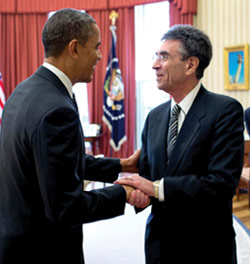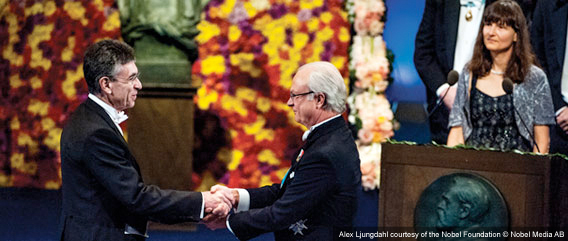Alumnus and Nobelist Robert Lefkowitz
For years, Robert Lefkowitz’66 had heard rumors that he might win a Nobel Prize—in Medicine. So the early morning October phone call on a Wednesday, not the Monday when the Nobel in Medicine is announced, caught him by surprise. He and a former trainee in his lab received the 2012 Nobel Prize in Chemistry for elucidating G-protein-coupled receptors, the largest class of cellular receptors and the most common target of therapeutic drugs, such as opiates, beta blockers, and antihistamines.
 Robert Lefkowitz’66 meeting President Barak Obama in November 2012
Robert Lefkowitz’66 meeting President Barak Obama in November 2012By Nobel Week in mid-December, the surprise had worn off and Dr. Lefkowitz reveled in the activities: lectures, galas, dinners, interviews, ceremonies, toasts, and the traditional signing of a café chair at Bistro Nobel in the Nobel Museum. Nobel Week followed more than two months of in-person and phone interviews and photo ops, including one with President Obama in the Oval Office (just part of a whirlwind visit to Washington, D.C., that included a symposium and a black tie dinner at the Swedish embassy).
Although the surprise wore off, the satisfaction of the Nobel Prize will last a lifetime. In his Nobel banquet speech, Dr. Lefkowitz told of his increased pride in sharing the Nobel with Brian Kobilka, who worked in the Lefkowitz lab at Duke University from 1984 to 1989. “I don’t know how often a Nobel Prize is shared by a mentor and former trainee, but perusing the list of recent winners suggests that it is a reasonably common occurrence. This highlights an aspect of science which is very important to both Brian and me, the mentoring of young trainees. I have trained more than 200 students and fellows in my lab over the past 40 years. They are in a very real sense a second family. Many of our trainees are major leaders in our field of science, a source of enormous pride for both of us.”
In an interview with the Howard Hughes Medical Institute (he has been an HHMI investigator since 1976), Dr. Lefkowitz spoke of his pride in being honored with Dr. Kobilka: “I cannot tell you how thrilled and proud I am. My 40-year career and his 30-year career tell one smooth, continuous story. Brian left my lab around 1989, and we kept in reasonable touch, as I do with many of my trainees. On Oct. 8, Brian and I Skyped for an hour and a half about a paper we are writing together. Thirty-six hours later we win the Nobel Prize. Back together again, in more ways than one.”
A 2008 alumni profile in P&S Journal described Dr. Lefkowitz’s belief in the importance of the mentor-mentee relationship—in his own career (he considers Paul Marks’49, Dickinson Richards’23, and Don Tapley mentors from his P&S days) and for the 200-plus trainees who have passed through his Duke lab: “Just as he learned the ropes by observing his own mentors in action,” the profile explained, “so an important part of his life’s work over the years has been demonstrating how it’s done. ‘In research, nobody can write down the rules. You can’t explain it. You can only show it.’”
Dr. Lefkowitz is the James B. Duke Professor of Medicine and professor of biochemistry and chemistry at Duke University, where he has been a faculty member for 40 years.
- Log in to post comments


